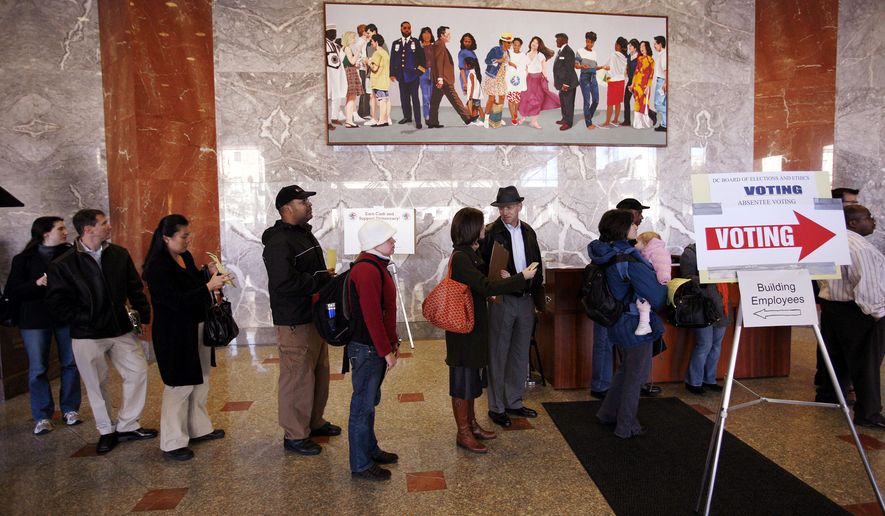The long-expired terms of the D.C. Board of Elections have become a point of contention in a ballot initiative for a minimum-wage increase — and a point of confusion about the validity of the District’s legalization of marijuana and the certification of the elections of top city leaders.
Lawmakers and legal experts on Wednesday expressed bemusement over the expired terms of the board’s members, which emerged as an issue Monday in a D.C. Superior Court hearing on a lawsuit aiming to remove the minimum-wage initiative from next year’s ballots.
Harry Wingo, president of the D.C. Chamber of Commerce, filed the lawsuit against the Board of Elections in August. Mr. Wingo said the initiative should be removed from the ballots, in part, because the board lacked authority since its members had exceeded their terms when they approved the measure in July.
But Rudolph McGann, the board’s attorney, argued Monday that Board of Elections members can remain active until they are replaced because the board is an independent agency under the D.C. Charter.
A decision by Superior Court Judge Maurice A. Ross, who is presiding over the lawsuit, could affect a lot more than just the minimum-wage initiative.
The mayor-appointed, three-member board is authorized to administer elections, voter registration and ballot access in the District, which includes certifying petition signatures and election results. A verdict that finds the board’s authority null because of the expired terms could raise questions about the validity of last year’s citywide elections, in which recreational marijuana use was legalized.
SEE ALSO: Federal appeals court voids ruling against D.C.’s restrictive concealed-carry gun law
Former Mayor Vincent C. Gray appointed Devarieste Curry, Stephen Danzansky and Deborah Nichols to the Board of Elections in 2011. Ms. Curry, whose term expired in July 2013, left her post in April last year — several months before the board approved the minimum-wage measure.
Ms. Nichols’ term expired in July 2012 and Mr. Danzansky’s in July 2014, but both stayed on and continued to serve. They were not reappointed by the mayor nor reconfirmed by the D.C. Council.
Ms. Nichols and Mr. Danzansky approved the minimum-wage measure. And all three certified the 2014 citywide election, which included the marijuana legalization measure.
Adam Eidinger, who chairs the DC Cannabis Campaign and has worked to get the minimum wage increase on the November ballots, said the District’s marijuana legalization laws shouldn’t be in question even if the sitting board members at the time had exceeded their term limits.
“We did everything by the book. We turned in 56,000 signatures. They were vetted by the staff, who are not appointed by the Board of Elections,” Mr. Eidinger said. “The idea that the three-member panel, which gives the final stamp of approval is somehow crucial to the integrity of the election is false. What is crucial is whether we went by the campaign rules. And we did.”
Mr. Eidinger said Mr. Gray is to blame if the minimum-wage question fails to get on the ballots and the marijuana law is called into question.
SEE ALSO: D.C. streetcar line in Northeast to start testing service without passengers
“He should have appointed BOE members when their terms expired,” he said. “It’s Vincent Gray’s revenge on Mayor [Muriel] Bowser.”
Several D.C. Council members declined to comment on Mr. Wingo’s legal argument and its possible ramifications.
Council members Mary Cheh, Ward 3 Democrat, and Elissa Silverman, at-large independent, said they wanted to take time to parse out the issue before taking a stance.
Ms. Bowser, who defeated Mr. Gray in the District’s Democratic primary, did not return calls for comment.
Judge Ross will hold on Jan. 29 the next hearing on the matter, which was first reported by WAMU.
• Ryan M. McDermott can be reached at rmcdermott@washingtontimes.com.




Please read our comment policy before commenting.